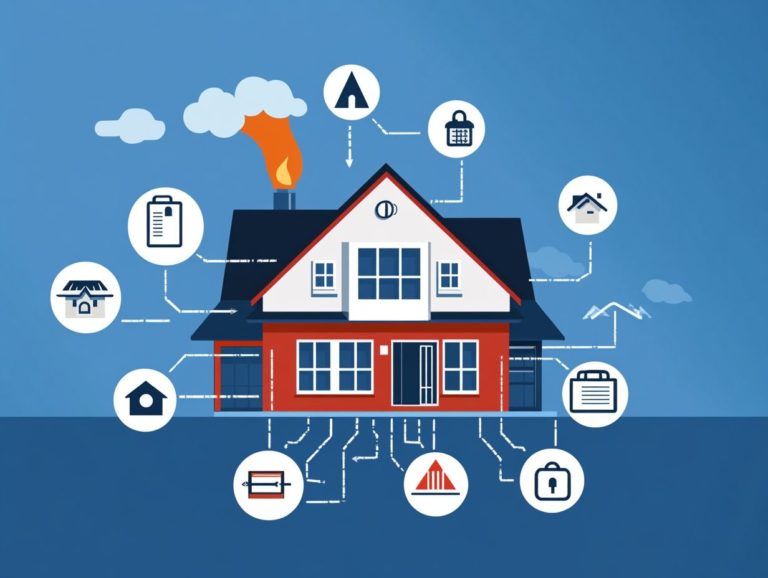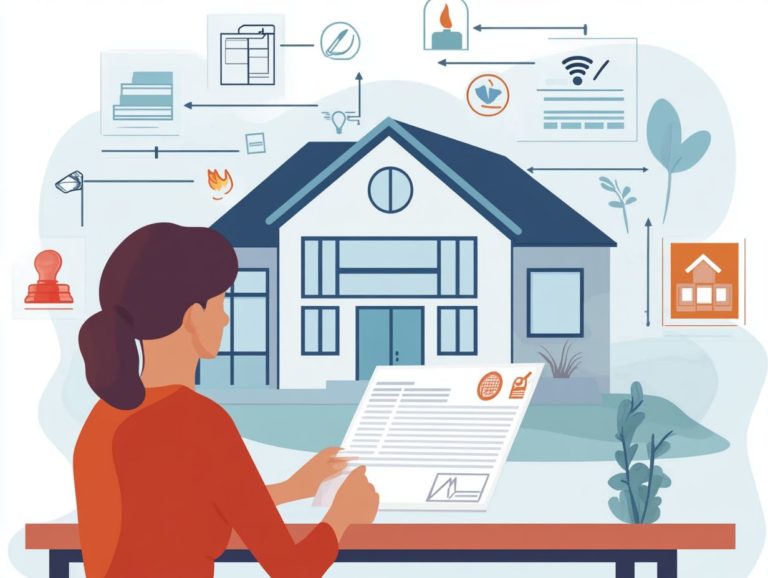5 Essential Features of Home Insurance for Renters
Renting a home provides you with the flexibility you desire, but it also introduces unique challenges, especially when it comes to safeguarding your belongings and ensuring your peace of mind.
Understanding home insurance for renters is essential, as it protects you against unexpected events like theft, damage, or liability concerns. This article delves into the five essential features of renters insurance, guiding you through personal property coverage, liability issues, and beyond.
It also highlights key factors to consider, common exclusions, and offers tips for filing claims. You ll have all the information necessary to secure the right coverage tailored to your needs.
Contents
- Key Takeaways:
- 1. Personal Property Coverage
- 2. Liability Coverage
- 3. Additional Living Expenses Coverage
- 4. Loss of Use Coverage
- 5. Medical Payments Coverage
- What Is Renters Insurance and Why Is It Important?
- What Are the Different Types of Renters Insurance Coverage?
- What Factors Should Be Considered When Choosing Home Insurance for Renters?
- What Are the Common Exclusions in Home Insurance for Renters?
- How Can a Renter Ensure They Have Adequate Coverage?
- What Are the Steps to Take When Filing a Claim for Home Insurance for Renters?
- Frequently Asked Questions
- What are the 5 essential features of home insurance for renters?
- How does personal property coverage benefit renters?
- What is liability protection and why is it important for renters?
- What does loss of use coverage entail?
- Does guest medical coverage only apply to guests on the rental property?
- Why is it important for renters to have additional living expenses coverage?
Key Takeaways:
- Personal Property Coverage protects your belongings in case of theft, damage, or loss.
- Liability Coverage provides financial protection if someone is injured in your rented home.
- Additional Living Expenses Coverage helps cover costs if your home becomes uninhabitable.

1. Personal Property Coverage
Personal Property Coverage is a cornerstone of renters insurance, offering essential protection for your belongings against risks like theft, fire, or damage. Understanding the key benefits of home insurance can help you rest easy knowing that you can recover your treasured items without facing significant out-of-pocket expenses.
Your personal property generally includes household items like furniture, electronics, clothing, and certain collectibles. Coverage limits can vary depending on your specific policy and the coverage amount you choose. Make sure to take a good look at what you own you ll want to protect your treasures!
Creating a detailed inventory list enhances your understanding of what needs protection and streamlines the claims process when necessary. It s important to recognize the difference between actual cash value which accounts for depreciation and replacement cost coverage, which makes sure you get enough money to buy new items at today s prices.
This distinction allows you to effectively safeguard your investments and maintain peace of mind.
2. Liability Coverage
Liability coverage in renters insurance serves as your safety net, shielding you from the financial fallout that comes with being held responsible for injuries or damages occurring in your rental home. This protection is invaluable, especially when faced with lawsuits or claims from third parties.
Having this coverage is essential it helps you manage medical expenses, legal fees, and potential settlements. Picture this: a guest trips and falls while visiting, or a personal item inadvertently damages another tenant’s property. Without adequate liability coverage, these unexpected events could impose a hefty financial burden on you.
Several factors can influence the limits of your coverage and your premiums, including your rental history, the location of your residence, and the specific policies offered by different insurance companies. That s why it s vital for you to meticulously review and understand your options.
3. Additional Living Expenses Coverage
Additional Living Expenses Coverage is an essential aspect of your renters insurance, designed to help you maintain your standard of living if your rental home becomes uninhabitable due to a covered event.
This policy typically covers crucial expenses like hotel stays, meals, and transportation, allowing you to concentrate on recovery instead of financial stress.
For instance, if a fire displaces you from your rental unit, you may need to secure temporary lodging, eat out, or commute to work from a new location.
When seeking insurance quotes, it s vital to realistically evaluate these potential costs and consider your unique circumstances.
Understanding the coverage limits is equally important; knowing the maximum amount you can claim will help ensure you select a policy that provides adequate financial protection during challenging times.
Don t wait until it s too late! Protect what matters most to you today by securing renters insurance.
4. Loss of Use Coverage

Loss of Use Coverage in your renters insurance policy offers vital financial support when your rental property becomes uninhabitable due to events like fire or flooding. This ensures you can cover your living expenses while repairs are underway, safeguarding your financial stability.
This coverage steps in when your normal living arrangements are significantly disrupted, whether from natural disasters or unfortunate accidents. It often includes payment for essential expenses like temporary housing, food, and utility bills, making your transition during displacement much smoother.
To successfully file a claim, document every expense with precision. Keep your receipts, take photographs of any damage, and maintain a detailed log of your living situation.
By adopting this proactive approach, you can enhance your chances of a successful claim, helping you navigate this challenging time with reduced financial strain.
5. Medical Payments Coverage
Medical Payments Coverage in renters insurance provides essential support by covering medical expenses for guests injured on your property, no matter who’s at fault. This offers peace of mind and shields you from potential liability claims.
This coverage is particularly beneficial in situations like slip and fall accidents or accidental injuries during gatherings. Unlike personal liability coverage, which tackles legal costs and damages if you’re deemed responsible, medical payments coverage zeroes in on immediate medical needs without requiring proof of fault.
Typically, these policies feature limits ranging from $1,000 to $5,000 per person. This allows you to manage smaller expenses without experiencing a financial burden. It’s crucial to review these options with your insurance agent to select the right mix of coverage that aligns with your lifestyle and potential risks.
What Is Renters Insurance and Why Is It Important?
Renters insurance is an essential safeguard for you as a tenant. It protects your personal belongings while providing liability coverage in the event of accidents or damages, making it a cornerstone of responsible rental living and financial security.
This type of insurance typically includes personal property coverage, ensuring that your electronics, clothing, and furniture can be replaced if they are lost or stolen. Additionally, it offers liability protection should someone get injured in your rented space, potentially covering legal fees and medical expenses. For new homeowners, understanding these aspects is crucial, which is why you should check out 5 key points about home insurance for new owners.
Renters insurance complements landlord insurance, which usually covers the building itself but leaves your possessions unprotected.
In today s unpredictable market, where unforeseen events can lead to property loss or damage, having this insurance is particularly significant. By assessing your unique insurance needs based on your personal circumstances such as the value of your belongings and your lifestyle you can select tailored coverage that aligns perfectly with your situation.
What Are the Different Types of Renters Insurance Coverage?
You have a variety of renters insurance coverage options available, each designed to address specific risks and protection needs. Be sure to consider the 5 features home insurance providers must offer when choosing the best policy for your needs.
- Personal Property Coverage: Protects your belongings think furniture, electronics, and clothing from risks like theft, fire, or natural disasters. Familiarize yourself with any exclusions, especially for high-value items, which may need additional coverage.
- Liability Coverage: Acts as your safety net against lawsuits stemming from injuries or damages that occur on the rented property.
- Medical Payments Coverage: Helps cover minor medical expenses for guests injured in your home, regardless of fault.
- Additional Living Expenses Coverage: Comes to your aid if your unit becomes uninhabitable. It often covers hotel stays or temporary housing arrangements.
When selecting the ideal mix of coverage, reflect on your lifestyle factors, such as the value of your personal belongings, your living situation, and any potential risks associated with your area. Talk to your insurance agent today to ensure you have the right coverage!
What Factors Should Be Considered When Choosing Home Insurance for Renters?

Choosing home insurance as a renter requires thoughtful consideration of various factors. These include your specific insurance needs, coverage limits, deductible amounts, and comparing rates to find the right balance of affordability and adequate protection for your personal belongings and liabilities, especially when considering the benefits of home insurance for renters.
Perform a thorough risk assessment. This will help identify the specific coverage needed based on your living situation and the items you own. By evaluating potential risks such as theft, fire, or water damage you can make informed decisions about the levels of protection you want to pursue.
Comparing different premiums gives you valuable insights into the market, enabling you to spot the best deals without skimping on essential coverage.
Working with knowledgeable insurance agents can further streamline your selection process. These professionals provide valuable guidance in navigating various options and help clarify policy details. This ensures you find the best plan for your unique lifestyle.
What Are the Common Exclusions in Home Insurance for Renters?
Understanding the common exclusions in home insurance for renters is essential. Many policies may not cover specific risks like floods, earthquakes, or damage resulting from neglect. To protect yourself, it’s crucial to recognize the importance of home insurance for renters, as this can help prevent vulnerability during critical incidents.
Exclusions exist because they cover high-risk events or unpredictable circumstances. For example, flood damage typically requires specialized coverage due to the ever-changing nature of flood zones. Earthquake damage is frequently excluded because of the varying seismic activity across regions.
To mitigate these risks, consider additional coverage options, such as separate flood or earthquake insurance. Review your policy details with an insurance broker, who can help identify any coverage gaps and guide you on the best options to protect your belongings and ensure your peace of mind.
How Can a Renter Ensure They Have Adequate Coverage?
To ensure you have adequate coverage, check your personal belongings and living situation. Start by maintaining an inventory list and consult with an insurance agent or broker for tailored recommendations on coverage limits and policies that align with your needs.
Creating an effective inventory list involves documenting each item, noting its condition, and assigning a value based on current market rates or receipts. This meticulous approach can prove invaluable during claims. Don t forget to take photos as visual proof of ownership.
Once your list is complete, reach out to insurance agents without hesitation to discuss personalized coverage plans that account for the unique aspects of your situation. Regularly review these coverage options.
Life events such as moving, acquiring new valuable items, or changes in family dynamics can significantly affect your insurance needs. Ensure you remain adequately protected at all times.
What Are the Steps to Take When Filing a Claim for Home Insurance for Renters?
When you file a claim for home insurance as a renter, follow a structured approach. This includes gathering the necessary documentation, promptly notifying your insurance company, and understanding the specifics of your policy and coverage types to ensure a smooth claims process.
Begin by collecting evidence of the incident think photographs of any damages and an inventory list of your lost belongings. It s crucial to report your claim to your insurance provider within the specified timeline, often within 30 days. This underscores the importance of acting swiftly.
Being aware of your deductible amount is vital. The deductible is the amount you pay out of pocket before insurance kicks in. It directly influences the payout of your claim. If disputes arise during the process, keeping detailed records of all communications with the insurance company can be invaluable in resolving issues effectively.
Regular follow-ups with your insurer will help ensure that progress is being made and that any questions you have are addressed. This ultimately steers you toward a satisfactory outcome.
Frequently Asked Questions

What are the 5 essential features of home insurance for renters?
Home insurance for renters includes personal property coverage, liability protection, loss of use coverage, guest medical coverage, and 5 essential riders for your home insurance that can enhance your policy.
How does personal property coverage benefit renters?
This coverage protects renters’ belongings from damage or theft. It covers items like furniture, electronics, and clothing, up to a specified limit, making it important to understand home insurance claims for renters.
What is liability protection and why is it important for renters?
Liability protection helps pay for legal and medical costs if someone is injured in the rented property. It also covers damages the renter may accidentally cause, like fires or floods. This is crucial since many renters can t afford these expenses on their own.
What does loss of use coverage entail?
Loss of use coverage helps renters pay for lodging, food, and other living expenses if their rental becomes unlivable due to a covered event. This is especially valuable during emergencies like fires or natural disasters.
Does guest medical coverage only apply to guests on the rental property?
Yes, guest medical coverage applies only to guests injured on the rental premises. It covers their medical expenses, like hospital bills, up to a certain limit.
Why is it important for renters to have additional living expenses coverage?
This coverage is vital as it helps with temporary living costs if the rental becomes uninhabitable. It can cover hotel stays, meals, and transportation, which can otherwise lead to significant financial strain.





